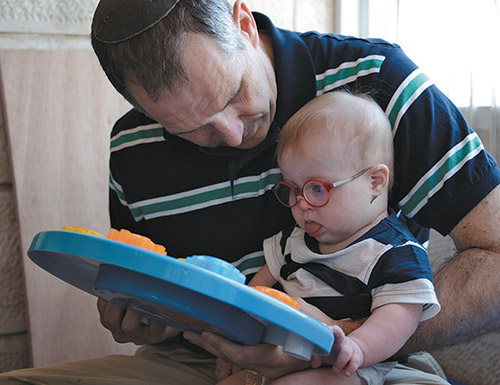
A father’s role in child raising is not only crucial for child development but is also transformative for men themselves.
In a world where family structure and cultural expectations are in flux, men are etching out a clearer picture of what it means to be a father in the 21st century. Israel is a leading voice in the conversation with groundbreaking scientific research that provides a more dynamic understanding of a father’s role, and an increase in support services for fathers, like Shalva’s support group for fathers of children with special needs.
After he got married, Avishai Dunir, Israeli father of four, felt the distinct shift in responsibility from his single days. When he had his first child the feeling of responsibility grew drastically. “Having kids automatically gives you a feeling of responsibility. You need to worry about every detail of the kids’ lives,” Dunir said.
According to a study by Ruth Feldman, a psychologist and neuroscientist at Bar-Ilan University in Ramat Gan, Israel, Dunir’s experience of a mind shift is rooted in science. Studies have already shown that during pregnancy and childbirth a woman’s brain changes to increase feelings of love, protectiveness and empathy and an increase in hormones encourages feelings of bonding and nurturing. While most people assume the change in brain activity happens exclusively as women become mothers, Feldman’s study found some surprising results about fathers too. “The findings show that the experience of hands-on parenting can configure a male caregiver’s brain in the same way that pregnancy and childbirth do for women,” Feldman says.
Without awareness of the science behind it, men see a difference from before and after they become parents. Hillel Chalfine, Israeli father of two boys, saw his attitude towards children change once he had his own. “I always liked kids,” Chalfine said, “but now I feel connected and fatherly towards all kids, even baby animals.”
The ramifications of these findings are deeply significant in the debate about traditionally designated male and female parenting roles. “This is the first study to look at the way dads’ brains change with child-care experience,” Kevin Pelphrey, a neuroscientist at Yale University, who was not involved with the study, said to ScienceMag. “What we thought of as a purely maternal circuit can also be turned on just by being a parent—which is neat, given the way our culture is changing with respect to shared parental responsibility.”
Although Chalfine and his wife share equal responsibility for their two children, other people don’t see his role as equal. “When I pick up my son from daycare the teacher doesn’t tell me how long he slept for, when he ate, his last diaper change—nothing.” Chalfine said. “But when my wife picks him up, the teacher speaks to her for 30 minutes.” Feldman’s findings can be game changing in shifting stereotypes people have about men’s role in raising their children, including validating the experience for men themselves. “We are responsible to make sure that the house is not just a place, but a home. It’s the work of the mother and father together,” Dunir said.
In addition to the change in paternal instinct, fatherhood brings about other unexpected changes in men. “The moment you become a father is the moment you are transformed, whether you want to or not,” Chalfine said. “Being a father gave me a lot more confidence and made me a lot less shy. It’s like there is something important that I need to do all the time, and because of that, I feel more important.”
For Dunir the deepest change came when his third child was born with Down Syndrome. “With a special needs child even simple things become complicated,” Dunir explained. “It requires more sacrifice, investment and compromise.” The challenge of their special needs child also brought their family together. “It really strengthened the connection between me and my wife and between the other kids,” Dunir said. “It’s like carrying a heavy closet, you can’t do it alone. You need everyone to carry it together, so it increases your sense of shared responsibility and strengthens your partnership.”
With a deeper and more nuanced psychological understanding of family structure, there is a growing number of support services for fathers. Shalva, an Israeli nonprofit that provides services for physically and mentally challenged children in Israel, started a support group for fathers of special needs children four years ago. “Common feelings among fathers of children with special need include isolation, hopelessness and the burden of additional household tasks,” a Shalva spokesperson said.
In many cultures, it’s still not typical for men to speak about their feelings, so support services for men are crucial to the health of the family. “In the house, the man feels like he needs to be strong and tough,” Dunir explained. “But at the support group, people can be more open and emotional.” Dunir also saw the effects of the group when he was at home. “It became easier to talk about things within the family. Everything was more on the table,” Dunir said.
Even though traditionally, women are seen as the main caregiver in the family, shifts in cultural norms and new scientific findings are changing our stereotypes. “It’s clear that we’re all born with the circuitry to help us be sensitive caregivers, and the network can be turned up through parenting.” Pelphrey says.
Men are embracing this role with ease. As Chalfine puts it, “Being a father is the best thing in the world.”
By Raizel Druxman









